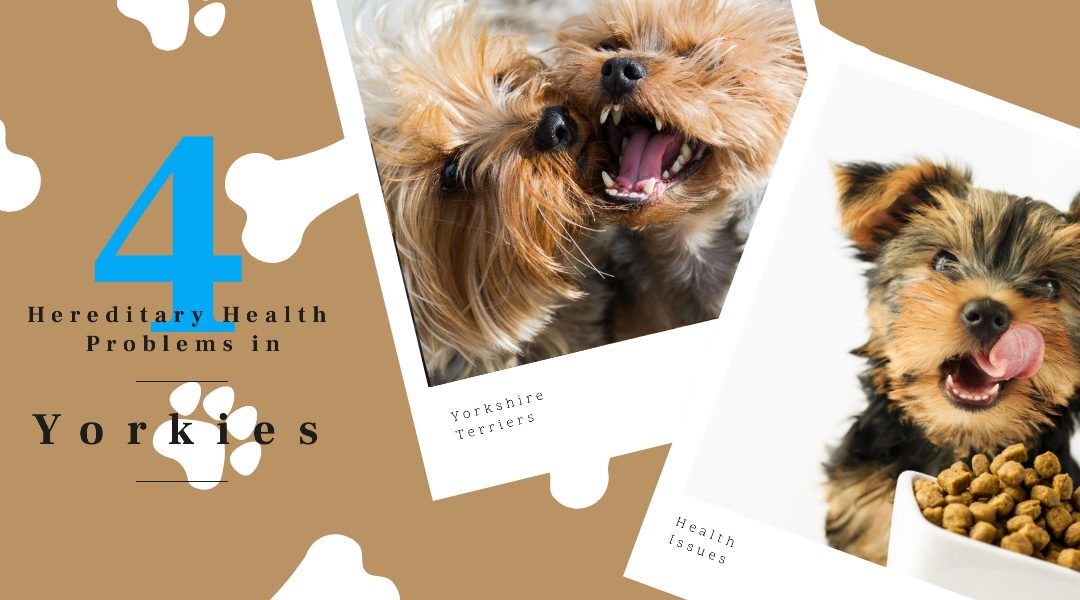Preparedness is the most important medicine for hereditary health problems in yorkshire terriers!
Yorkshire Terriers are incredibly popular little dogs – in fact they ranked #3 overall among all registered dogs in the U.S.A. in 2009 and #6 in Canada. But they’re not without their health problems?
Yorkies Health Problems Aren’t Unique
Like all purebred dogs, Yorkies have hereditary issues that are a result of years and years of breeding to produce the tiny terrier we all love. You may have heard about hip dysplasia problems with Golden Retrievers or that Scottish Terriers have a greater chance of developing some cancers than other purebreds. Sadly every dog breed has its own list of hereditary health concerns and conditions, and Yorkies are no exception. However by choosing your dog breeder very carefully and following some common sense rules, you can help minimize some of these problems. ?
The “big four” hereditary Yorkie health problems they can inherit are:
- Patellar Luxation – or “floating” kneecaps. The kneecap or patella actually slips in and out of place.
- Collapsing Trachea – ever heard a really wheezy old terrier? Likely his trachea has started to collapse. The cartilage rings that normally hold the windpipe round, begin to deteriorate.
- Portosystemic Shunts (PSS) – also known as a liver shunt, can occur while the pup is still in its mother’s womb. Development is abnormal and the result is, blood from the intestines goes only partly through the liver, and the rest mixes into general circulation. So normal toxins aren’t fully cleared by the liver, and your dog becomes ill.
- Cushing’s disease – Canine Cushing’s is a serious threat and unfortunately, Yorkies are high on the list of susceptible breeds.

Minimizing the impact of these hereditary diseases
First and foremost, find a reputable breeder who is screening his breeding stock for inherited diseases. Don’t be afraid to ask a breeder what’s being done to trace health problems in the line and to prevent them. A responsible breeder who loves her dogs won’t be offended and will be happy to explain.
Here are ways some of the other common inherited health problems can be minimized.
The problem of “floating” kneecaps, where you can actually hear the kneecap slipping in and out of place, can be greatly improved by keeping your Yorkshire Terrier’s weight within recommended ranges for his size (your Vet can tell you more) and by trying to reduce how many times your pup jumps down off furniture. I say, “try to reduce” because being a Yorkie lover myself, I know that these little sprites love to bounce all over the room and are independent, curious dogs who’ll suddenly take it into their heads to go and explore. However the more you can stop those jarring jumps, the better.
Don’t wait until your Yorkie starts wheezing before addressing Collapsing Trachea problems – use a harness instead of a collar, and be aware of any pressure on her neck and throat area at all times.
Liver shunt or PPS is very difficult to predict or control but again, a sensible diet and weight and regular exercise, all go a long way in keeping your dog healthier, longer. If your dog is affected, your Vet may recommend a low protein diet and possibly surgery.
Cushing’s Disease occurs when the normal hormonal feedback loop goes crazy — and too much cortisone, a natural steroid hormone, is produced by the adrenal glands. It’s a common condition in older dogs, often mistaken for the aging process itself — because the dog will gain weight, lose hair, pee in the house, and so on. Typical symptoms include increased thirst and urination, panting, hair loss (usually on the body), and weakness. The good news is your vet can prescribe medication to greatly reduce these problems. Since that medication can be rather expensive and is ongoing, it’s a good reason to look in to pet health insurance as soon as you get your Yorkie puppy.
With your love and care, and the help of your Veterinarian, your Yorkshire Terrier can have a very long and healthy life, despite some common hereditary health problems.





Our yorkies are five years old and the trouble we’ve got is their teeth!! We clean them but their mouths are really small and we can’t get to the back teeth hence smelly breath!!!!
My first Yorkie had Cushings, chronic gastrointestinal disease, allergies. He lived to be 18.